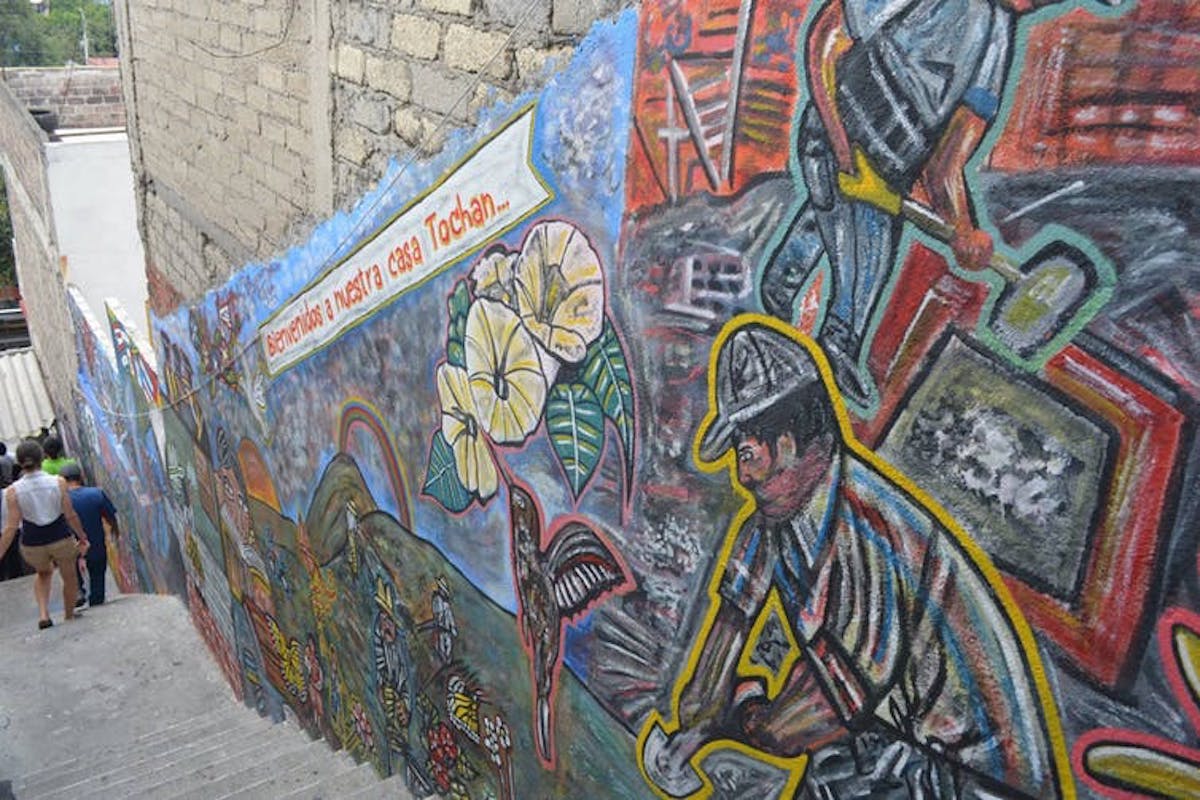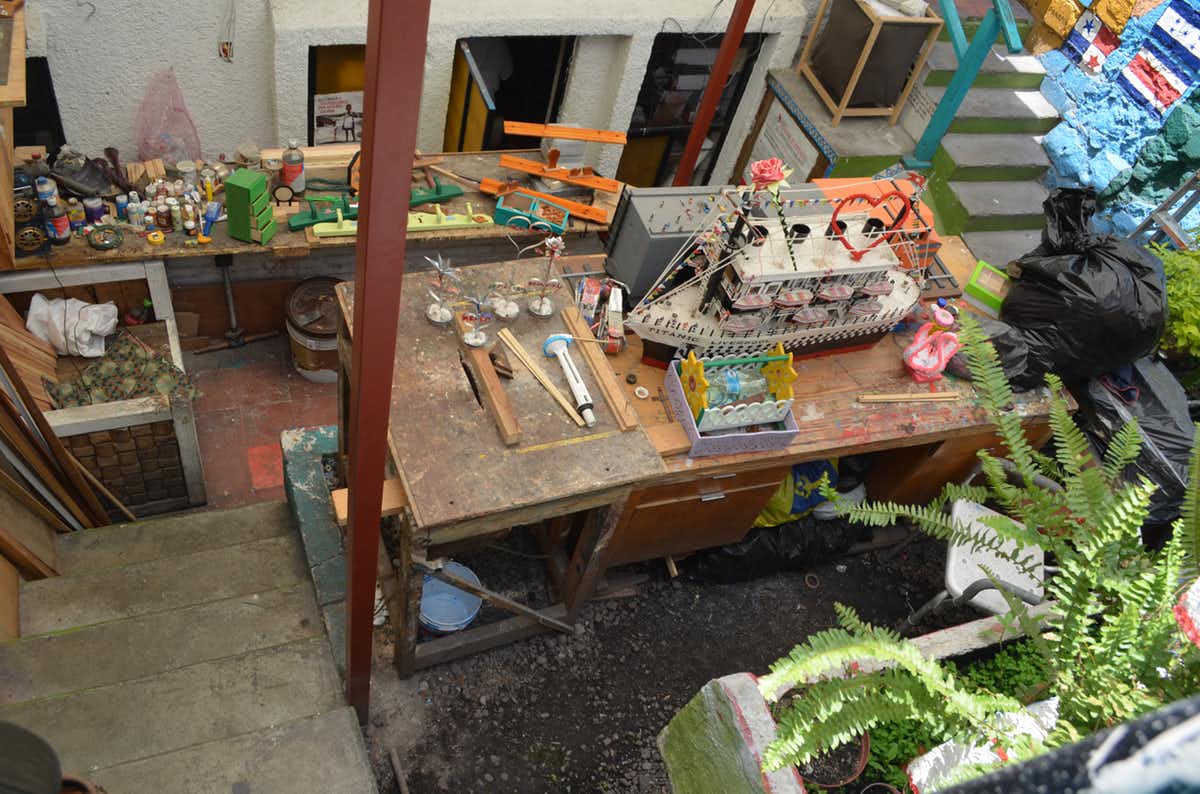

Central American asylum seekers paint murals on Casa Tochan, a refugee shelter in Mexico City. (Doris Bara, Author provided)
By Stacey Wilson-Forsberg, Wilfrid Laurier University
In January, a caravan of nearly 1,000 Central American asylum seekers crossed Mexico’s southern border with Guatemala. They followed in the footsteps of more than 7,000 asylum seekers who passed through earlier in October.
The Northern Triangle region of El Salvador, Guatemala and Honduras continues to experience endemic poverty, extremely high homicide rates and widespread gang activity. These dire circumstances drive migration flows to the north.
The United States, until recently, was the northern destination of choice for Central American asylum seekers. It was a “promised land” where they would find personal security and economic prosperity.
In contrast with those in earlier caravans, these newcomers to Mexico are unlikely to embark on the futile 4,000-kilometer journey north to the United States. Mobility to the U.S. is becoming increasingly more dangerous and the U.S.-Mexico border is more difficult to cross at both official and unofficial ports of entry.
President Andrés Manuel López Obrador directed officials at the Mexico-Guatemala border to distribute humanitarian visas to the newest caravan. The visas will allow the Central Americans to live and work in Mexican territory for one year while they navigate the country’s refugee determination process.
Central American asylum seekers are now stranded in Mexico. The journey north has left them in a state of limbo, keeping them tacked down in a location where they did not intend to stay permanently.
Mexico Attempts to Fulfill Obligation to Refugees
Mexico received 28,000 asylum claims in 2018, and 7,000 are backlogged from 2017. Its Law on Refugees is framed by the 1984 Cartagena Declaration on Refugees.
The Cartagena Declaration grants protection for people whose lives are threatened by generalized violence who would not be considered refugees under the 1951 United Nations Refugee Convention.
In this respect, Mexico is attempting to fulfill its international obligation to refugees. However, its refugee protection system is massively under-resourced and unprepared to handle so many asylum cases.
The Art of the Wait for Asylum
Asylum seekers who hold humanitarian visas often reside in temporary migrant shelters called albergues. Mexico City is home to several albergues that divide guests by age and gender.
Over the past two years, I have conducted research at one of these shelters, Albergue Tochán in southwestern Mexico City. Tochán (nuestra casa, our home in Náhuatl) houses men who have experienced violence in their country of origin or along their journey through Mexican territory.
Tochán responds to the basic needs of the men, including the provision of beds, clothing, meals and toiletries. The tall windowless structure with irregular architecture and steep stairways resembles a clean, warm, welcoming, albeit very cramped home. However, it runs over capacity with far fewer beds than guests.


Casa Tochán rooms (Doris Bara, Author provided)
While at the albergue, the men are free to come and go. They use computers equipped with internet, watch television at specified hours and they adhere to a strict schedule of household chores.
I interviewed 15 of these men over many hours while accompanying them in daily activities, and visiting with my undergraduate students.
As a researcher, I can’t help the thousands of Central Americans who are stranded in Mexico. But, I can help tell their stories. I believe stories can bring some humanity to a population that has been vilified and rendered nameless by recent political discourse.
They Want to Be Remembered
Refugee determination procedures create many uncertainties and anxieties. Asylum seekers often find themselves in situations of indefinite and unpredictable waiting.
Research has shown that the long wait for asylum in a host country can cause more stress and mental anguish than the events that happened before the refugee claimants went into exile.
The men at Tochán spoke about their current reality and described their daily activities, frustrations and coping mechanisms. They narrated their hopes and aspirations for the future, and they detailed the abuses they endured in the past.
The men were keen to talk—they want their stories to be documented. Many asked that they be identified in publications so that they could leave a piece of themselves behind in case they did not survive deportation back to Central America.
The men spoke about their sense of exclusion in a new territory. They worried that their asylum claims would be rejected, resulting in official and permanent eviction from Mexico.
As days become weeks, and weeks turn into months, their notions of time and space need to be continually recalibrated as the wait drags on.
Waiting defines their identity. Some of the men reported no longer knowing who they are anymore or what they are waiting for. They described feeling “useless,” “not even human,” “impotent,” “powerless,” like a “beggar” and living “half lives.”
Anxiety, uncertainty and lack of control over one’s life and future are clearly factors inherent to the collective experience of the men at Tochán.
Finding Unity in Art
The men have been busy.
Multiple activities guide the men’s days. They attend Sunday morning mass and afternoon soccer matches, and they craft and sell wooden artesanías, masks and paintings.
They paint enormous colorful murals that cover virtually every surface of the albergue and throughout the surrounding neighborhood.


Art therapy has proven to be a helpful tool for these refugees. (Doris Bara, Author provided)
With the assistance of local artists, the director of Albergue Tochán has introduced art as therapy and as a source of income. While hesitant at first, the men have gradually found ways to express and distract themselves through art while they navigate daily, weekly and monthly waiting for the legal validation of their refugee status.
Through art, asylum seekers have been provided the opportunity to share and learn from each other.
While painting together, they find a level of comfort and unity as they learn to trust and rely on each other.
As their initial dream of reaching the United States deteriorates during the long wait at the albergue, the men learn to embrace a Mexican hope: the possibility of staying in a new location while waiting for an uncertain future.![]()
![]()
This article is republished from The Conversation under a Creative Commons license. Read the original article.



my family waited years to come here legally. each one had to come separate and prove they had a job and a place to stay. my friends waited years to bring their children here. separated for years. this has always been